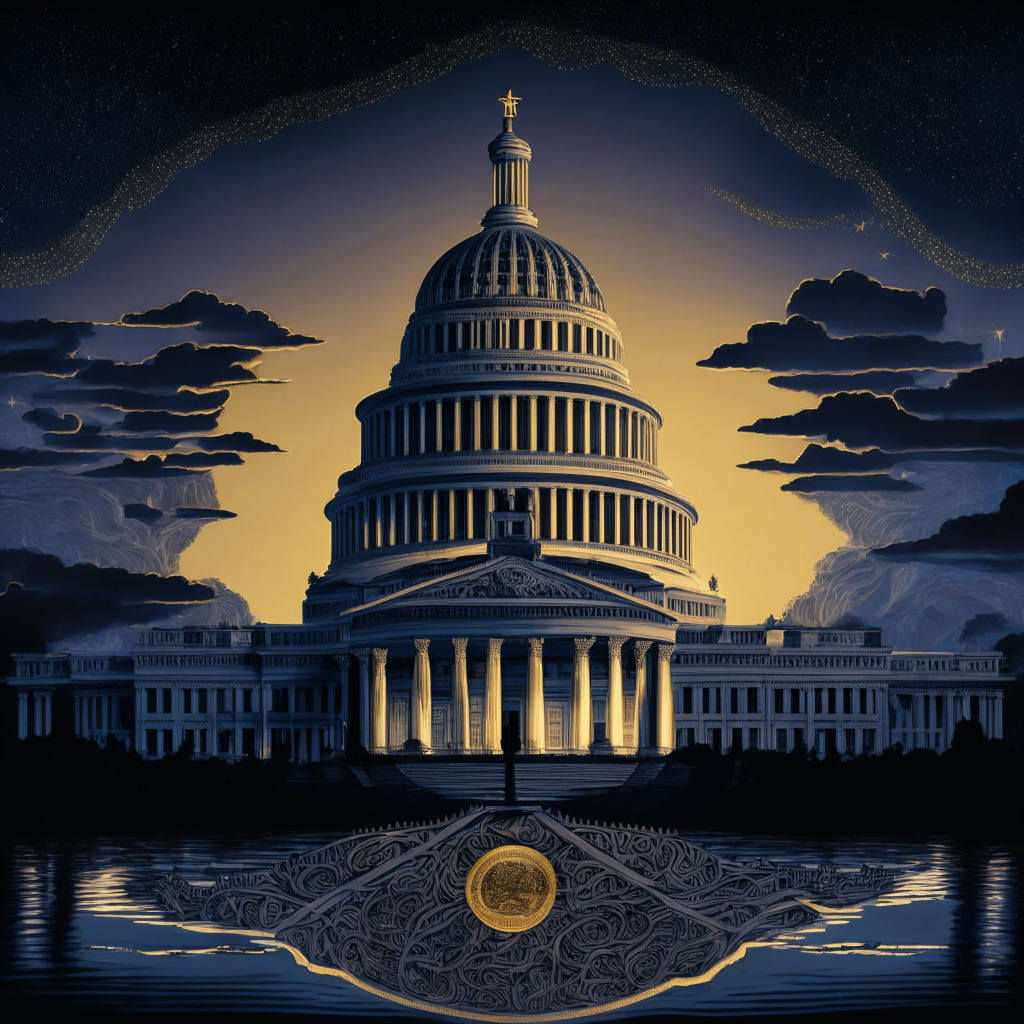The U.S. House of Representatives is considering the introduction of a Central Bank Digital Currency (CBDC), amidst contrasting views. Democrat Rep. Stephen Lynch calls for a pilot project for a digital dollar, stressing it is “absolutely critical” for the U.S. to show leadership in digital currency development. However, concerns remain regarding transaction management, tracking, and potential regulatory limitation issues.
Search Results for: U.S. Treasury Department
Navigating the Storm: Treasury’s Proposed Crypto Tax Rules Stir Controversy and Promise
The U.S. Treasury Department’s proposed digital assets tax rules have sparked controversy within the crypto community. The debate revolves around the feasibility of regulating decentralized operations and potential implications for wallet vendors, decentralized exchanges, and smart contract systems. Nonetheless, a clear taxation path might facilitate easier engagement with digital assets.
Clash of the Titans: Crypto Community vs U.S. Treasury in Tackling Anonymity and Regulation
“Regulation in the crypto world came under scrutiny after a lawsuit backed by Coinbase challenged the U.S. Treasury Department’s sanctions on Tornado Cash, a crypto transaction platform. Despite uproar from the crypto community, a judge ruled that the Treasury acted within its powers, escalating the ongoing tension between crypto advocates and regulatory bodies.”
U.S. Crypto Regulation: Balancing Innovation and Compliance in the Blockchain Era
“The U.S Congress moved closer to regulatory clarity with two crypto-related bills: the Financial Innovation and Technology for the 21st Century Act, aimed at crypto company registrations, and the Blockchain Regulatory Certainty Act, aiming to cut down barriers for blockchain developers. However, potential conflicts between lawmakers and industry operators may lead to strenuous compliance requirements, possibly bringing the crypto industry closer to traditional finance rules and limitations.”
U.S. Senate Tightens Crypto Regulations in NDAA 2024: A Necessity or Threat to Blockchain Freedom?
The U.S. Senate’s passage of the 2024 National Defense Authorization Act introduces tighter regulations for financial institutions engaged in crypto trading, marking a significant legislative shift. The bill targets crypto mixers and “anonymity-enhancing” crypto assets and aims to strengthen compliance with money laundering and sanctions laws.
Bitcoin Plunges to $30,600: Unexpected U.S. Employment Data Shakes Financial Markets
The value of Bitcoin plunged to $30,600 following surprising US employment data indicating 497,000 private-sector jobs added in June. This resulted in significant financial market fluctuations, with speculation of further Federal Reserve rate hikes affecting crypto and stock markets negatively.
Impact of $173B Treasury Bills Auction on Crypto Market: Risks and Opportunities Explained
The U.S. Treasury Department’s $173 billion Treasury bills auction could drain U.S. dollar liquidity from the financial market and increase selling pressure on the crypto market, including Bitcoin. This move raises the risk of recession and may result in higher volatility and weaker returns for cryptocurrencies. However, the long-term outcome remains uncertain, as some investors may hedge against recession and inflation with digital currencies.
Poloniex Pays Millions in U.S. Treasury Settlement: Costly Compliance Lesson for Crypto Exchanges
In a recent development, cryptocurrency exchange Poloniex has agreed to pay a hefty sum of […]
Debating the CANSEE Act: Crypto’s Regulatory Future or Innovation Stifler?
The Crypto-Asset National Security Enhancement and Enforcement (CANSEE) Act, aims to enforce stricter KYC/AML regulations on decentralized finance (DeFi) operations. Critics worry that the bill, requiring financial responsibility from project investors, can deter potential backers. The act also plans to increase anti-money-laundering capabilities of the U.S. Treasury Department extending to nontraditional financial structures like cryptocurrency.
Balancing Privacy and Transparency: Pros and Cons of a US Central Bank Digital Currency
The U.S. Treasury Department explores Privacy Enhancing Technologies (PETs) to protect privacy and anonymity in potential digital dollar transactions. As the U.S. considers introducing a Central Bank Digital Currency (CBDC), addressing risks and striking a balance between privacy and transparency remain top priorities for policymakers.
Fed’s Potential $100B Loss and Its Impact: Turmoil or Triumph for Bitcoin?
Industry analyst Marcel Pechman discusses the challenges inflation presents to the Federal Reserve and the potential financial risks of their lenient monetary strategy. He suggests these issues may lead individuals to explore secure alternatives like Bitcoin and other blockchain technologies.
Rollercoaster Predictions: Bitcoin’s Potential Rise to $22K Amidst Market Uncertainty
“Despite the gloomy market sentiment and legal hurdles from SEC, market analysts forecast Bitcoin could hit the $22K mark. U.S. inflation drop and Federal Reserve’s liquidity drainage could push investors to alternative assets like Bitcoin. However, serious challenges still remain.”
Sanction Enforced: Binance Removes Banco de Venezuela from P2P Services
“In a move to enforce international financial sanctions, Binance, the world’s largest crypto exchange, has eliminated a payment method attached to Banco de Venezuela from its P2P trading service. This action reflects the limited room for maneuver that global crypto exchanges have amidst international sanctions and raises questions about the extent to which the promises of cryptocurrencies hold true in a regulated market.”
Tornado Cash Co-Founder Arrest and Debate on Developer Responsibility in Blockchain Regulation
Tornado Cash co-founder, Roman Storm, was arrested over money-laundering charges. The case has raised debates about responsibility and control within the blockchain industry, particularly for software developers. This controversy suggests that future blockchain regulation is navigating uncertain territory.
Tornado Cash Founders Charged: A Blow for Privacy or Triumph for Law Enforcement?
“Roman Storm and Roman Semenov, key figures of Tornado Cash, are facing charges for helping North Korea’s Lazarus Group launder over $1 billion via a privacy mixer. This incident sparks debate on blockchain privacy protections being exploited by criminals versus the potential shortfalls of legal jurisdiction in regulating such abuses.”
Decoding the Legal Matrix: Tornado Cash, DAOs, and the Future of Blockchain Oversight
A recent legal case saw a federal judge approving U.S. Treasury’s sanctions on Tornado Cash, a crypto tool allegedly used by North Korea for money laundering. The ruling, which validated an enforcement action against a Decentralized Autonomous Organization (DAO), sets a compelling precedent for DAOs’ future role in crypto projects.
Upholding Sanctions on Crypto Mixer Tornado Cash: A Regulatory Triumph or Freedom Infringement?
“A federal judge in Texas validated sanctions on Tornado Cash, a crypto mixing service, dismissing concerns that the Treasury Department overstepped their jurisdiction. This significant precedent for regulatory authority over crypto services underscores the need to balance user anonymity with oversight for illicit activities.”
2024 NDAA and Crypto: Striking Balance between Oversight and Innovation
The United States Senate has passed the 2024 National Defense Authorization Act that targets crypto mixers, crypto trading institutions, and anonymous coins. The bill draws provisions from the Digital Asset Anti-Money Laundering Act and the Responsible Financial Innovation Act for improved oversight on crypto-based activities. Key measures include examination standards for crypto, preventing FTX-style events, and studies to curb anonymous crypto transactions.
Blockchain’s Role in Securing the AI-Driven Future: An Essential Counteraction to AI Threats
“AI’s potential benefits come with risks, such as new attack avenues for cybercriminals. Blockchain technology could counter these security threats introduced by AI. Its immutable, decentralized storage combats unauthorized modifications or tampering with datasets that define AI models, assuring data integrity and preventing unauthorized AI utilization.”
Making Waves: Binance’s Battle to Change Crypto Compliance Perception
Binance, the world’s largest cryptocurrency exchange, is striving to break the perception of the crypto industry’s non-compliance. With a comprehensive compliance team including former law enforcement officers, regulators and crypto and banking experts, they actively combat potential financial crimes, monitor international regulatory developments and maintain customer due diligence. Despite facing legal challenges, Binance continues its rigorous compliance efforts.
Crypto Market Recovering Amid Regulatory Tensions: Binance vs SEC and CBDC Evaluations
The crypto market shows signs of recovery as the U.S. inflation rate cools and the Fed abstains from raising interest rates. Leading cryptocurrencies report nominal gains, while Binance faces legal battles with the SEC. Key events this week include discussions on central bank digital currencies and support for a draft bill to regulate cryptocurrencies, indicating that regulatory debates play a crucial role in shaping the future of the crypto market.
Cryptocurrencies, Fentanyl, and China: Balancing Regulation and Innovation
Senator Elizabeth Warren highlighted a connection between cryptocurrency payments and China-based firms supplying fentanyl precursors, raising concerns on the need for effective cryptocurrency regulations. Critics argue that imposing more regulations might hinder the growth and innovation of blockchain technology. Senator Warren plans to reintroduce legislation addressing the regulatory gaps related to illicit cryptocurrency use while safeguarding potential innovations in finance.
Cryptocurrency, Fentanyl Trade, and Balancing Regulation: An In-Depth Analysis
Senator Elizabeth Warren highlights the connection between cryptocurrency and the Chinese fentanyl trade, proposing the Digital Asset Anti-Money Laundering Act to halt such transactions. Striking a balance between security and innovation is crucial in regulating the blockchain and digital asset sector.
Zero-Knowledge Compliance Tools: Balancing Privacy and Regulation in DeFi and Web3
Etonec partners with Mina Foundation to develop a zero-knowledge proof-powered regulatory compliance tool for the DeFi and Web3 markets. This solution will maintain user privacy while addressing KYC and AML regulations, potentially attracting more institutional investors and providing unprecedented data control for users.
Balancing Blockchain Privacy with AML Enforcement: A Brewing Conflict
The anti-money-laundering bill highlights the conflict between blockchain privacy and law enforcement responsibilities. As private blockchains develop and financial privacy demand grows, concerns arise over the effectiveness of AML and CFT regulations, leading to potential clashes with constitutional protections and existing legal frameworks.
Sanctioned Ethereum Wallet Sparks Debate: Cryptocurrency Convenience vs Illicit Activities
The U.S. Treasury’s OFAC has imposed sanctions on Russian firms and individuals, including an Ethereum wallet, for assisting Russia in evading existing punitive measures amidst the Ukrainian conflict. The case underscores the dual nature of cryptocurrencies as convenient cross-border transaction tools and potential means for illicit activities, emphasizing the need for balancing their benefits with security safeguards.
Appointing DOJ’s Crypto Director: Balancing Security & Open-Source Innovation
The U.S. DOJ’s National Cryptocurrency Enforcement Team, led by Eun Young Choi, focuses on combating cybercrimes involving cryptocurrencies, including social media scammers and online fraudsters. Despite only 1% of transactions being tied to illegal activities, the crypto community must acknowledge its downsides and work on strategies to ensure long-term success and safety.
Bank Collapses Fuel Crypto Adoption: Risks and Rewards in a Turbulent Financial Landscape
The recent collapse of major banks has raised concerns about financial infrastructure stability, leading to increased skepticism about centralized banking policies. This may result in a significant rise in cryptocurrency and NFT prices, with more people turning to Web3 alternatives for improved flexibility, efficiency, and decentralized finance solutions across multiple industries.
Crypto Mining Tax: Balancing Environmental Impact and Industry Growth
The Biden administration proposes a 30% tax on crypto mining firm’s energy costs, aiming to counter environmental pollution, higher energy prices, and increased greenhouse gas emissions. However, this industry-specific penalty could impact profits and faces resistance from congressional Republicans.
Poloniex Settles $7.59M Sanctions Violations: Lessons for Crypto Exchanges
The recent settlement of $7.59 million by crypto exchange Poloniex over allegations of sanctions violations […]
Regulatory Grip Tightens on Crypto: Analyzing the Ripple Case and Crypto Wallets Sanctions
Recently, a motion by the SEC against Ripple hit a roadblock in court due to the regulatory body’s failure to address substantial legal questions. This highlights the complex legal environment surrounding crypto assets. These developments, including new sanctions on crypto wallets, suggest that the road to comprehensive blockchain regulations is fraught with controversy and challenges.
Regulatory Tightrope: Striking Balance between Crypto Transparency and Investor Safety
U.S. Sen. Sherrod Brown’s call to regulators for promoting transparency and safeguarding investor interests suggests a push for stronger authority over digital assets. This results in questioning the readiness of the crypto enthusiasts to embrace potential regulatory changes in the crypto realm.































